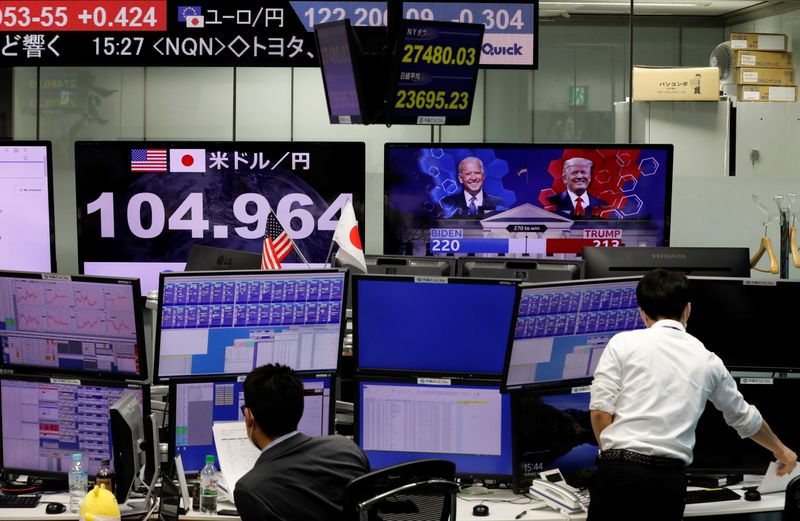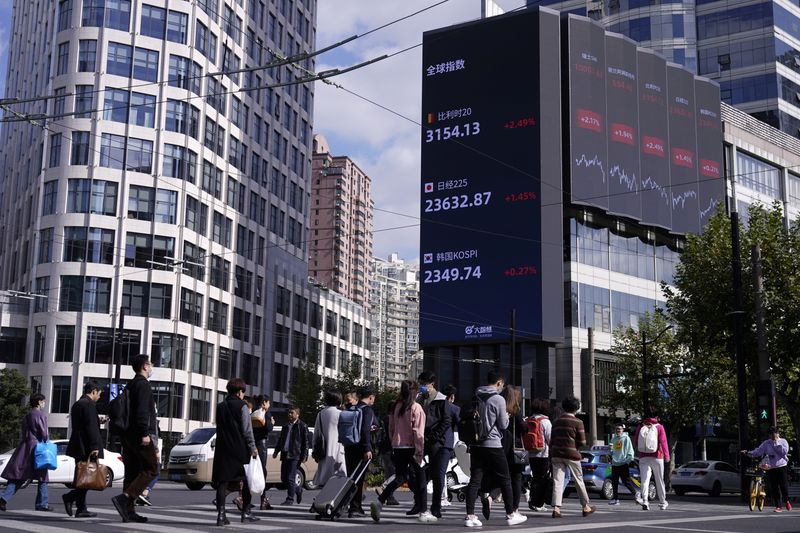By David Randall and Tom Arnold
NEW YORK/LONDON (Reuters) - Investors began pricing in a greater chance of gridlock in Washington, scaling back predictions of a large coronavirus relief bill, as votes continued to be tallied from Tuesday's U.S. presidential election, which was much closer than opinion polls had suggested.
That saw some tempering of so-called "reflation" trades that had predicted a strong Democratic score in presidential and U.S. Senate races would lead to a bigger stimulus and higher inflation, as well as some safe-haven buying on caution that the election is so close.
"There is no blue wave," said Robert Sears, chief investment officer at Capital Generation Partners. "The chance of a lot of fiscal spending ... that scenario is out of the window now because it looks like Republicans are going to keep the Senate."
"Markets had priced in a Democratic sweep over the last few days, and with greater prospects of divided government, the fiscal response in 2021 looks much different," said Katie Deal, Washington Policy associate analyst at T. Rowe Price.
U.S. Treasuries gained and the dollar shuffled between gains and losses as investors calculated that even if Democratic challenger Joe Biden were to win the White House, his party may not have the support of the Senate needed to push through the large fiscal stimulus investors had hoped for.
Technology stocks surged, with the tech-heavy Nasdaq Composite (IXIC) recently up nearly 4%, reflecting bets on receding chances of a Democratic takeover of Washington that could usher in higher capital gains taxes or tougher antitrust measures.
Even though Wall Street's "fear gauge," the CBOE Volatility Index (VIX), eased, it remained unusually high, reflecting the likelihood that it may be days before the result is known in the three key Rust Belt states of Michigan, Wisconsin and Pennsylvania.
Reflecting that uncertainty, betting markets swung violently on the presidential vote. Early in the count, bookmakers flipped from having for months assumed a Biden win to suddenly pricing a high probability that President Donald Trump would keep the White House. But as votes streamed in, they reversed again and now strongly favor Biden's chances - up to 70% or more.
Trump won the battleground state of Florida and with the race down to a handful of states, both Trump, 74 and Biden, 77, had possible paths to reach the minimum 270 Electoral College votes needed to win.
The U.S. dollar (=USD) jumped to its highest in three months against the euro before giving up some gains, while the yield on the 10-year U.S. Treasury note (US10YT=RR) slipped off five-month highs as investors prepared for prolonged political uncertainty.
NO 'BLUE WAVE'
But some investors saw fading chances for Democrats to score a big win in the Senate and regain control of the upper chamber as Republicans held the line in several contests that had seemed up for grabs.
Markets have been fixated in recent weeks on prospects for a massive stimulus bill to help the U.S. economy recover from the coronavirus pandemic, which has killed more than 230,000 Americans.
The prospect of a "Blue Wave" sweep in which Biden wins and Democrats capture the Senate had gained a great deal of investor attention in recent weeks. It was seen as the surest path to a massive fiscal package that could support equities and accentuate trends of a weaker dollar and a steeper yield curve due to greater government spending.
Analysts at Societe Generale (PA:SOGN) said the picture so far "blurs the path towards a fiscal stimulus package and causes reflation trades, still palpable yesterday, to unwind."
Antoine Bouvet, senior rates strategist at ING in London said the thought "is that regardless who wins the presidential race, Congress will remain divided. This justifies a reversal of the ‘reflation trade' that was priced in the run-up to vote."
Some investors see a Trump win, which would take tax hikes favored by Biden off the table, as a best-case scenario for the stock market. Ahead of the election, JPMorgan (NYSE:JPM) predicted an "orderly" Trump victory as the most favorable outcome for equities.
The increased chance of continued Republican control of the Senate was seen as decreasing the chance of rising capital gains taxes and boosting tech, said Andrew Brenner, head of international fixed income at NatAlliance Securities.
Since the 2016 election of Trump, who ushered in corporate tax cuts that supported equities but also imposed trade tariffs that led to volatility, the U.S. stock market has gained over 57% and hit new highs.
Investors remain most worried about the presidential race being too close to call or contested for a while.
"Markets can live with either candidate," said Francois Savary, chief investment officer at Swiss wealth manager Prime Partners. "The scenario they don't want are legal problems over the outcome and significant political unrest."

(GRAPHIC: World stocks market cap rise over last four years - https://fingfx.thomsonreuters.com/gfx/mkt/bdwpkjmoovm/Pasted%20image%201604323646730.png)
